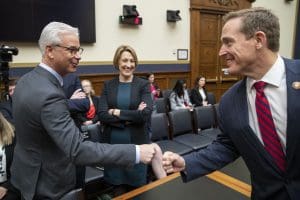GOP Senate nominee Ted Budd sided with banks as they poured money into his campaigns
North Carolina Republican Rep. Ted Budd received numerous industry donations after votes to lift a cap on debit card transaction fees and to prevent financial companies from having to provide credit scores to customers.

During his three terms in Congress, North Carolina Republican Senate nominee Ted Budd has reliably cast votes that align with the favored positions of the banking and credit card services industry. The industry has in turn given him hundreds of thousands of dollars in campaign contributions.
Budd, who represents North Carolina’s 13th Congressional District, serves on the House Financial Services Committee, which oversees the housing and banking services sector and consumer protection laws. He has frequently cast votes that would protect the interests of financial services companies rather than those of his constituents.
Budd voted against the Protecting Your Credit Score Act of 2020, which would have required financial companies to provide credit reports and other information to consumers.
He opposed the Consumers First Act of 2019, which would have protected consumers’ rights to file class-action lawsuits against credit card companies and other financial providers.
Both bills passed in the House, but were not given a vote in the Senate.
In 2019, Budd voted no on a nonbinding resolution urging financial companies to “work proactively with their customers affected by the shutdown of the Federal Government who may be facing short-term financial hardship and long-term damage to their creditworthiness through no fault of their own.” The resolution passed in the House.
During his first months in Congress, Budd backed an effort in 2017 to repeal a consumer protection provision of the Dodd-Frank Wall Street Reform and Consumer Protection Act, enacted in 2010, that capped how much credit card companies could charge retailers in fees for debit card purchases.
Although Budd, who owns a gun store, stressed his experience running a small business during his 2016 campaign for the House, one of his first acts after he assumed his congressional seat was to back an effort to repeal the cap, contained in an amendment added by Illinois Democratic U.S. Sen. Dick Durbin.
In a May 2017 Washington Examiner opinion piece, Budd wrote, “It’s a price control, and what used to be a private market that delivered a world-changing innovation is now under the supervision of the federal government. The effects are typical for this type of policy — they’re the same ones we saw in the Soviet Union, and the same ones we saw during Nixon’s price controls in the 1970s. At the end of the day, somebody pays.
“Now, instead of businesses that accept debit cards, the person who pays is the consumer. Free checking has plummeted, and minimum account balances have increased dramatically. Price controls often serve as price floors, and small businesses that take debit cards have seen their costs rise because regulation has squeezed the flexibility out of the system.”
That July, Bloomberg noted his efforts in a story titled “Taking Wall Street’s Side, Young Congressman Infuriates Allies.” It quoted ads sponsored by the National Retail Federation, a trade group for merchants, denouncing Budd as a Wall Street “pawn.”
In the weeks before and after Budd’s May 4, 2017, committee vote to advance the “Financial CHOICE Act” repeal, financial services political action committees rewarded him with donations.
These included $1,000 from Discover Financial Services; $5,000 from Regions Financial Corporation; $1,000 from the Bank Policy Institute; $1,000 from the American Financial Services Association; $2,000 from Bank of America; $2,500 from the American Bankers Association; $2,000 from Citigroup Inc.; $2,000 from JPMorgan Chase & Co.; $2,500 from Capital One Financial Corp.; and $2,500 from Mastercard International.
A Budd spokesperson did not immediately respond to an inquiry for this story.
Budd posted on his official House website a May 17, 2017, Washington Examiner article highlighting how the banking industry was rewarding him for his efforts.
The story noted that the Electronic Payments Coalition, representing credit card providers and banks, was running radio ads in his House district lauding him and saying he “stood up to the big retail lobbyists” and “greedy big box retailers.”
“The bottom line is that Durbin has thrown a million consumers out of the banking system, and I’m going to fight it as hard as I can,” Budd told the paper. “I’m grateful for any support at home on this issue.”
In total, Budd has received more than $344,000 in contributions from commercial banks during his career, according to OpenSecrets, and at least $157,000 from financial and credit services companies. This ranks both groups as among his top 10 largest sources of industry campaign cash.
Budd will face Democratic former North Carolina state Supreme Court Chief Justice Cheri Beasley in the general election in November. The winner will replace retiring Republican Sen. Richard Burr.
In a statement, North Carolina Democratic Party spokesperson Kate Frauenfelder told the American Independent Foundation: “This is yet another example of the stark contrast in this race: While Congressman Budd is beholden to his corporate backers and part of the problem in Washington, Cheri Beasley will stand up for the people and stay focused on holding politicians and corporate interests accountable and putting North Carolina first.”
Budd’s fealty to his banking industry donors fits his pattern throughout his career of voting with industries that fund him over the interests of his North Carolina constituents.
The American Independent Foundation has previously reported that Budd has cast votes favored by industries while taking significant campaign contributions from them, including payday lenders, oil and gas companies, pharmaceutical manufacturers, and the gun lobby.
Published with permission of The American Independent Foundation.
Recommended

New NC GOP chair flirts with bogus stolen election conspiracies
Simmons predecessor was a staunch 2020 election denier
By Jesse Valentine - April 19, 2024
Texas activists pushed abortion restrictions in NM cities and counties, records show
Emails reveal influence and control in exchange for promises of legal help
By Austin Fisher, Source NM - March 04, 2024
Cannabis workers across Missouri begin push to unionize dispensaries
The first day was a breeze. Sean Shannon and Danny Foster walked into several marijuana dispensaries around Missouri with their matching “Union For Cannabis Workers” shirts and talked to employees about the possibility of unionizing. “The first day, there were 57 stops amongst the teams,” said Shannon, lead organizer with UFCW Local 655, which actually […]
By Rebecca Rivas - December 04, 2023










































































